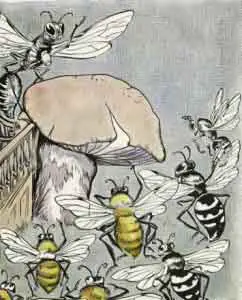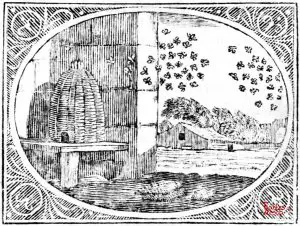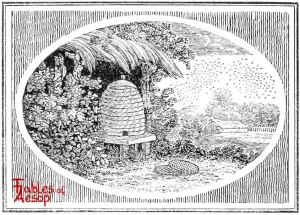Drones took over a hive. The Bees objected and asked the Wasp to judge the issue. The Wasp asked each side to build a comb. Bees did, Drones not. Bees won.
Pretenders will be found out.

Aesop For Children (The Bees and Wasps, and The Hornet)
A store of honey had been found in a hollow tree, and the Wasps declared positively that it belonged to them. The Bees were just as sure that the treasure was theirs. The argument grew very pointed, and it looked as if the affair could not be settled without a battle, when at last, with much good sense, they agreed to let a judge decide the matter. So they brought the case before the Hornet, justice of the peace in that part of the woods.
When the Judge called the case, witnesses declared that they had seen certain winged creatures in the neighborhood of the hollow tree, who hummed loudly, and whose bodies were striped, yellow and black, like Bees.
Counsel for the Wasps immediately insisted that this description fitted his clients exactly.
Such evidence did not help Judge Hornet to any decision, so he adjourned court for six weeks to give him time to think it over. When the case came up again, both sides had a large number of witnesses. An Ant was first to take the stand, and was about to be cross-examined, when a wise old Bee addressed the Court.
“Your honor,” he said, “the case has now been pending for six weeks. If it is not decided soon, the honey will not be fit for anything. I move that the Bees and the Wasps be both instructed to build a honey comb. Then we shall soon see to whom the honey really belongs.”
The Wasps protested loudly. Wise Judge Hornet quickly understood why they did so: They knew they could not build a honey comb and fill it with honey.
“It is clear,” said the Judge, “who made the comb and who could not have made it. The honey belongs to the Bees.”
Moral
Ability proves itself by deeds.

JBR Collection
A party of Drones got into a hive, and laying claim to the honey and comb which they found there, tried to force the Bees to quit. The Bees, however, made a sturdy resistance, and the Drones were not unwilling to agree to their proposal that the dispute should be referred for judgment to the Wasp. The Wasp, pretending that it was a hard matter to decide, directed both parties to make and fill some comb before him in court, so that he might see whose production most resembled the property in dispute. The Bees at once set to work, but the Drones refused the trial; so the verdict was given by Judge Wasp in favour of the Bees.

Samuel Croxall
A PARCEL of Drones got into a hive among the Bees, and disputed the title with them, swearing that the honey and the combs were their goods. The Bees were obliged to go to law with them, and the Wasp happened to be judge of the cause; one who was well acquainted with the nature of each, and therefore the better qualified to decide the controversy between them. Accordingly, gentlemen, says he, (speaking to both plaintiff and defendant) the usual method of proceeding in these courts is pretty chargeable, and slow withal; therefore, as you are both my friends, and I wish you well, I desire you would refer the matter to me, and I will decide betwixt you instantly. They were both pleased with the offer, and returned him thanks. Why, then, says he, that it may appear who are the just proprietors of these honeycombs (for being both so nearly alike, as you are, in colour, I must needs own the point is somewhat dubious) do you, addressing himself to the Bees, take one hive; you speaking to the Drones, another; and go to making honey as fast as you can, that we may know, by the taste and colour of it, who has the best title to this in dispute. The Bees readily accepted the proposal, but the Drones would not stand to it. And so Judge Wasp, without any farther ceremony, declared in favour of the former.
THE APPLICATION
Nothing is so sure a sign of a man’s being, or at least thinking himself in the wrong, as his refusing to come to a reference. And, how happy would it be for the public, if our judges now-a-days were empowered to dispatch causes in that easy, expedite way which the Wasp in the fable made use of. But, as it is, the impudent, idle, good for-nothing drones, of the nation many times possess those favours and benefits, which should be the rewards of men parts and industry.
Princes may easily be imposed upon, if they will take every little fellow’s word for the measure of his own merit. And it is indeed scarce possible that the encouragements of a court should always be dispensed to the most deserving men; but such are too modest to offer themselves. But it highly concerns any government, in the dipensation of its favours, to distinguish those who behaved well; and not to let places of profit and advantage be run away with by drones, who never exerted the least degree of merit.

Thomas Bewick (The Bees, The Drones, and The Wasp)
A number of Drones, who had long lived at their ease in a hive of Bees, without contributing by their labour to make any honey, at length began to dispute the right of the Bees, and insisted that both the honey and the combs were their property. The Bees, after much altercation, at last offered to leave the dispute to reference, and this being assented to by the Drones, the Wasp was chosen umpire. Accordingly, he began by declaring, that as both parties, he hoped, were his friends, and he wished them well, he would instantly proceed upon the investigation. I must own, says he, that the point is somewhat dubious, for I have often seen you both in the same hive, and excepting that the Drones are of a more portly size and appearance, you are all otherwise nearly alike in person: but as I have not been able to see who worked, and who did not, I know of no mode in which I shall be enabled to judge so correctly, as by setting each party to work at the making of the honey. Therefore, addressing himself to the Bees, you take one hive; and you, speaking to the Drones, will be so good as to take another, and both go to work to make honey as fast as you can. The Bees readily accepted the proposal; but the Drones hung back, and would not agree to it. So, so! says Judge Wasp, I see clearly how the matter stands; and without further ceremony, declared in favour of the Bees.
APPLICATION.
The surest method of detecting ignorance and inability, is to put arrogant pretenders to the test, and appreciate their claims by a fair trial; and when those who assume the merit due to works of ingenuity, refuse to prove their title by a display of their talents, we may well conclude that their pretensions are unfounded, and that they are mere impostors. When men, who are at the head of national affairs, will not be at the pains to find out merit (for men of that character are too modest to obtrude themselves) they will be surrounded by a swarm of idle, impudent, good-for-nothing drones; and these too often succeed in obtaining those benefits which should be the reward of men of parts, integrity, and industry.

Apes, Fuci, et Vespa
Apes in alta quercu favos fecerant, quos fuci inertes dicebant esse suos. Lis ad forum deducta est, vespa iudice, quae, cum genus utrumque nosset pulcherrime, legem hanc proposuit duabus partibus: “Non inconveniens est corpus, et par est color, ut plane res in dubium merito venerit. Sed, ne religio mea peccet imprudens, alvos accipite et ceris opus infundite ut, ex sapore mellis et forma favi, auctor appareat horum de quibus nunc agitur.” Fuci recusant; apibus conditio placet. Tunc illa talem sententiam rettulit: “Apertum est quis non possit et quis fecerit. Quapropter apibus fructum suum restituo.”
Perry #504


